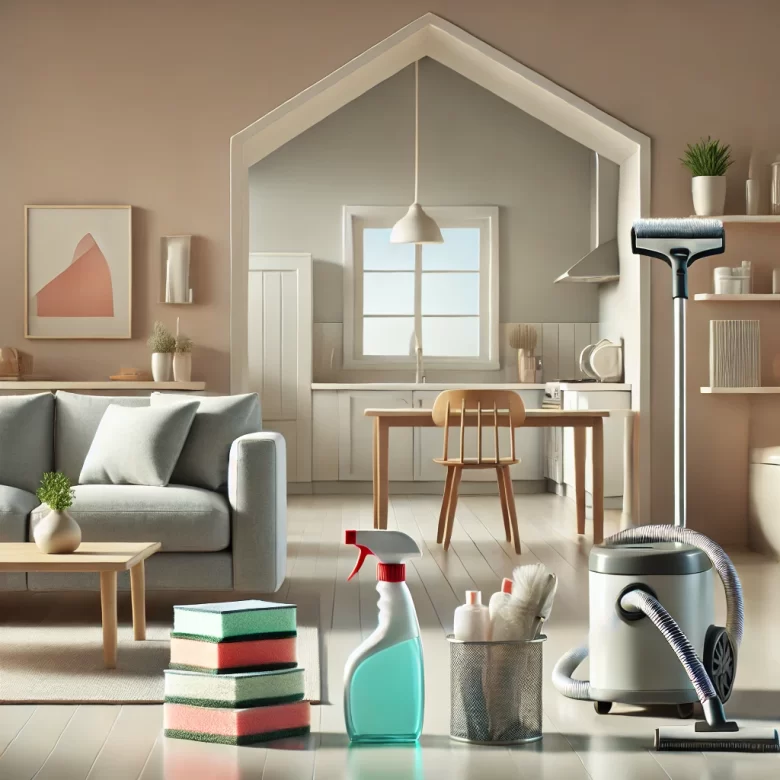Introduction
Keeping a home clean and organized can often feel like a full-time job. Between work, family, and social commitments, house care is something that many people struggle to keep up with consistently. However, maintaining a clean and welcoming home doesn’t have to be overwhelming. With the right mindset, systems, and habits in place, you can simplify your approach and reduce stress while still keeping your space tidy and functional. In this article, you’ll learn practical strategies to simplify house care, clean smarter—not harder—and build routines that help you stay on top of household tasks without feeling drained or frustrated.
The Pressure of Modern Housekeeping
Today’s lifestyle often demands that we juggle multiple roles at once. You might be a professional, a parent, a partner, and a friend—all while trying to maintain a presentable home. The societal pressure to keep a picture-perfect home only adds to the stress, especially when time and energy are limited. However, the reality is that your home doesn’t need to be spotless 24/7. It just needs to function well for your life. The key lies in simplifying—not complicating—your cleaning routines, creating practical systems that work with your lifestyle rather than against it.
Shift Your Mindset About Cleanliness
The first step toward stress-free house care is reframing your mindset. Many people aim for perfection, which leads to frustration and burnout. But perfection isn’t the goal—consistency is.
Change the way you think about “clean”:
- Focus on function over perfection: A clean home is one that supports your life, not one that looks like a showroom.
- Embrace “good enough”: Daily maintenance doesn’t need to be deep cleaning. It just needs to keep your home livable and hygienic.
- Celebrate progress: Any effort you make counts. Tidying a single area is still a win.
By releasing the pressure of perfection, you create space for sustainable habits that support you, rather than stress you out.
Create a Simple Daily Routine
You don’t need to dedicate hours each day to cleaning. A simple 15–30 minute routine can help you stay on top of basic tasks and avoid mess from piling up.
Example of a Simple Daily Cleaning Routine:
- Morning (10 minutes):
- Make the bed
- Wipe down bathroom surfaces
- Load/unload dishwasher
- Evening (15 minutes):
- Tidy the kitchen counters
- Quick vacuum or sweep high-traffic areas
- Declutter common spaces (living room, entryway)
Benefits of a daily routine:
- Prevents mess from building up
- Reduces the need for large cleaning sessions
- Creates structure and predictability
Consistency, even in small actions, is what keeps your home manageable over time.
Use the “Clean as You Go” Method
This method is incredibly effective in reducing the stress of having to clean everything at once. It’s about incorporating light cleaning into your daily activities so tasks don’t accumulate.
How to Clean as You Go:
- While cooking: Wash dishes or wipe counters during downtime.
- After using the bathroom: Wipe the sink or spray the mirror to keep it fresh.
- After changing clothes: Put laundry directly into the hamper, not on the floor or furniture.
These mini-tasks take less than a minute but save you hours of cleaning later.
Establish Weekly “Zones”
Rather than trying to clean your whole house in one day, divide it into zones and clean one each day. This approach breaks large tasks into manageable chunks.
Sample Weekly Cleaning Zones:
- Monday: Kitchen
- Tuesday: Bathrooms
- Wednesday: Bedrooms
- Thursday: Living areas
- Friday: Entryways and hallways
- Saturday: Laundry and linens
- Sunday: Rest or catch-up
Each zone gets focused attention once a week, which keeps things in rotation and prevents overwhelm.
Declutter Regularly
Clutter is one of the biggest contributors to household stress. The more items you have, the more time and energy it takes to clean and maintain your space. Simplifying your belongings makes cleaning easier and faster.
Quick Decluttering Tips:
- Follow the 1-in-1-out rule: For every new item that enters your home, remove one.
- Set a timer: Spend 10 minutes decluttering one drawer or shelf per day.
- Donate or discard: Don’t hold onto items “just in case” if they no longer serve a purpose.
A clutter-free home is easier to clean and feels more peaceful.
Stock Smart Cleaning Tools
The right tools can make all the difference in keeping your home clean with minimal effort. You don’t need a closet full of products—just a few well-chosen, multipurpose tools.
Must-Have Cleaning Essentials:
- Microfiber cloths (washable, reusable)
- All-purpose cleaner (safe for multiple surfaces)
- Handheld vacuum or broom for quick pickups
- Toilet brush and bowl cleaner
- Disinfecting wipes (great for fast bathroom touch-ups)
Keep your supplies easily accessible in a small caddy or storage bin so cleaning is always within reach.
Involve Everyone in the Home
House care shouldn’t fall on one person’s shoulders. Whether you live with family, a partner, or roommates, sharing the load reduces stress and builds a sense of shared responsibility.
How to Delegate Cleaning Tasks:
- Assign age-appropriate chores: Even young kids can put toys away or dust.
- Use a visible chart: Keep it on the fridge or shared calendar.
- Rotate tasks weekly: So no one feels stuck with the same job forever.
When everyone contributes, the home runs more smoothly—and cleaning feels less like a burden.
Use the 20-Minute Power Clean
When the house feels chaotic and you don’t know where to start, the 20-minute power clean is your secret weapon. It’s a quick, focused burst of cleaning that makes a big visual impact.
How to Do a Power Clean:
- Set a timer for 20 minutes.
- Put on music or a podcast.
- Choose one area (e.g., kitchen or living room).
- Clean and tidy as much as you can in that time.
This technique works well before guests arrive or when you’re short on time and want to quickly refresh your space.
Make Cleaning Enjoyable
Let’s be honest—cleaning is rarely exciting. But you can make it more enjoyable by adding a bit of fun or motivation to the process.
Ideas to Make Cleaning More Fun:
- Create a cleaning playlist with upbeat songs.
- Listen to a podcast or audiobook while you clean.
- Use pleasant-smelling products to create a sensory reward.
- Set mini goals and reward yourself (e.g., coffee break after cleaning the kitchen).
When cleaning becomes part of a positive experience, you’re more likely to stick with it.
Know When to Outsource
There’s no shame in asking for help. If your schedule is packed or cleaning causes anxiety, consider outsourcing occasional tasks. Hiring help—even once a month—can lift a huge weight off your shoulders.
Ways to Get Support:
- Hire a cleaning service for deep cleans.
- Ask a friend or family member to help organize a room.
- Use delivery or laundry services to free up your time.
Your time and peace of mind are valuable. Investing in support can be worth it.
Embrace the Power of Habit
Creating habits around house care is one of the most effective ways to ensure that your home stays clean without overwhelming you. When cleaning tasks become part of your daily routine, they require less effort and mental energy to complete.
How to Build Effective Cleaning Habits:
- Start small: Begin with one simple task, like making the bed or wiping down the kitchen counter every morning.
- Set reminders: Use your phone or sticky notes to remind you to complete specific tasks.
- Link cleaning tasks to existing habits: Pair your cleaning habits with something you already do. For example, you can make a habit of wiping down the bathroom sink immediately after you brush your teeth.
- Track progress: Check off tasks on a weekly cleaning chart or app. This not only helps you stay on track but also provides a visual cue that motivates you to keep going.
When you make cleaning a habit, it no longer feels like a chore, and the results will speak for themselves.
Focus on High-Impact Areas
Instead of spending time cleaning every single inch of your house, focus on the areas that make the biggest difference to the overall appearance and feel of your space. High-impact areas are the ones that make your home feel clean without requiring an extensive cleaning session.
Key High-Impact Areas to Focus On:
- Kitchen countertops and dining area: These surfaces are used daily and are often visible to guests. Keep them clear of clutter and wipe them down after meals.
- Living room: Fluff pillows, fold blankets, and tidy up the coffee table. These small tasks make a noticeable difference.
- Bathroom sink and mirror: These are high-touch areas, so keeping them clean can instantly elevate the cleanliness of your bathroom.
- Entryway: A clean and organized entryway sets the tone for the rest of the house. Make sure shoes are stored neatly and the space is decluttered.
By focusing on these high-impact areas, you’ll keep your home looking clean and welcoming with minimal effort.
Stay on Top of Seasonal Cleaning Tasks
While daily and weekly routines help keep things under control, there are certain cleaning tasks that need to be done less frequently but are still important to the overall cleanliness of your home. Seasonal cleaning tasks can be scheduled to keep your home in top shape without adding stress.
Examples of Seasonal Cleaning Tasks:
- Deep cleaning carpets and upholstery: Depending on the material and usage, this might only need to be done a few times a year. If you have pets or children, you may want to clean more often.
- Clean out closets and storage areas: A seasonal purge of your closet and storage spaces helps prevent clutter from accumulating over time.
- Wash windows and clean vents: While windows and vents don’t need to be cleaned every week, doing this at least twice a year helps maintain cleanliness and improves air quality in your home.
Schedule these tasks on your calendar every 3-6 months to prevent them from piling up and making house care feel like an overwhelming event.
Make Cleaning a Family Activity
If you share your home with others, it’s important to get everyone involved in maintaining cleanliness. The more people who contribute, the less work each person has to do—and the more fun it can be. Additionally, involving children or roommates in house care teaches them responsibility and contributes to a sense of teamwork.
How to Involve the Whole Family in House Care:
- Create a chore chart: Whether it’s for kids or roommates, a chore chart outlines specific tasks and ensures everyone knows what they’re responsible for.
- Make it a game: Turn cleaning into a challenge. Set a timer for 10 minutes and see who can tidy the most items within that time frame. This can make cleaning more enjoyable for kids, or even adults!
- Have a “cleaning party”: Put on music and clean together. This can be a great way to bond while knocking out household tasks.
- Reward progress: At the end of the week, reward everyone for sticking to their cleaning duties. Rewards could be as simple as a movie night or a treat after the cleaning is done.
By getting everyone involved, house care becomes a shared responsibility, and no one feels overwhelmed by the work. Plus, it fosters a positive attitude toward maintaining a clean home.
Avoid Cleaning Fatigue with Breaks
If you find yourself getting burned out by cleaning, it’s important to take regular breaks. Pushing through cleaning tasks without giving yourself time to rest can lead to exhaustion and frustration, which can make you feel like giving up.
How to Avoid Cleaning Fatigue:
- Set timers: Work for 20–30 minutes, then take a 10-minute break. During this break, relax, stretch, hydrate, or do something enjoyable to recharge your energy.
- Break up tasks: If a cleaning job feels too daunting, break it down into smaller chunks. Clean one room or one surface at a time, then take a short break before moving on to the next task.
- Take care of yourself: Don’t forget to prioritize self-care. Taking a warm bath, meditating, or going for a walk after cleaning can help restore your energy.
Recognizing the signs of fatigue and giving yourself permission to rest is key to keeping cleaning from feeling like a never-ending cycle of stress.
Conclusion
House care doesn’t have to be a source of stress. By simplifying your approach and focusing on routines that work with your lifestyle, you can maintain a clean home without feeling overwhelmed. Small, consistent efforts, such as embracing habits, focusing on high-impact areas, and involving others in house care, can make a big difference in how your home looks and feels. Remember, the goal isn’t perfection—it’s about creating a space that supports your well-being and your life. A clean home can be achieved through practical systems, less clutter, and a little bit of effort each day. As you implement these strategies, you’ll find that house care becomes a natural, less stressful part of your routine, leaving you more time to enjoy the things you love.




